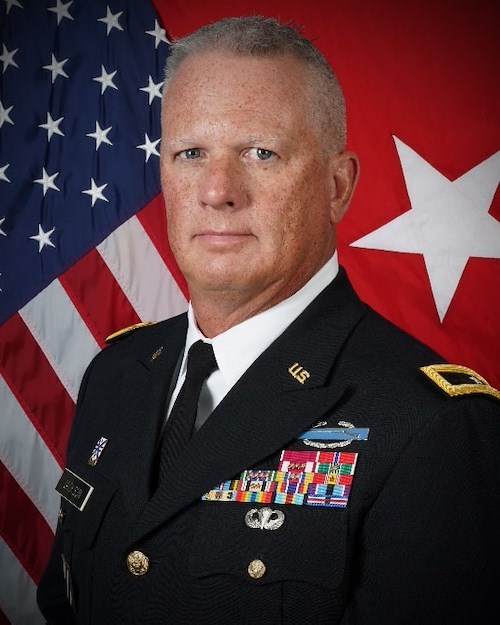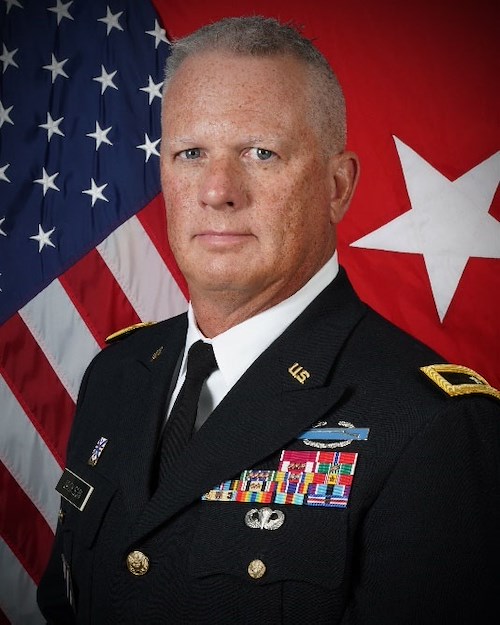Gallery contains 1 image
×
Photo 1 of 1
Brigadier General Mark C. Jackson
Brig. Gen. Mark C. Jackson
Photo by: U.S. Army Africa Public Affairs
VICENZA, Italy -- While COVID-19-related travel restrictions have prevented Brig. Gen. Mark C. Jackson, the U.S. Army Southern European Task Force, Africa deputy commanding general, from being physically present at SETAF-Africa headquarters in Vicenza and at events on the African continent, he is actively engaged with SETAF-Africa’s leadership and African partners, as well as with United States-based leaders of the National Guard State Partnership Program units that are affiliated with countries in U.S. Africa Command’s area of responsibility.
Jackson also currently serves as the Illinois National Guard director of the joint staff. In addition to developing and coordinating all policies, programs and plans in joint matters that affect Illinois' 13,000 Army and Air National Guard personnel, he is responsible for integrating and coordinating the Illinois National Guard capabilities in support of homeland defense and defense support to civil authorities operations.
As he prepares for events scheduled to take place on the African continent in coming months, Jackson agreed to participate in a question and answer session to discuss his role as the SETAF-Africa deputy commanding general.
Q: How would you describe your role as SETAF-Africa deputy commanding general?
A: My job is to support Maj. Gen. Andrew M. Rohling and his vision and mission for the U.S. Army in Africa and to improve SETAF-Africa’s success in Africa by continuing to build and refine systems that enable our Soldiers to operate in a degraded environment on the continent. I’m also working with the adjutants general across the nation who have a State Partnership Program affiliation with any of the countries in Africa. Right now, there are 13 of those that we are building relationships with so (General) Rohling can have this consortium with them.
Q: As the Illinois National Guard joint staff director, have you been directly involved with the state’s response to COVID-19?
A: Yes. I took over the job on March 1, 2020, and by March 15, we were involved in cyber protection for the primary election, then the pandemic, and we also still had floods along the Mississippi River and civil disturbance. We had executed four of the 11 plans in our all hazards plan book by May 2020. It’s been quite a busy year. Right now we have still got people on COVID missions in vaccine teams.
Q: How do you hope to advance/impact SETAF-Africa’s relationships with our African partners?
A: I’m looking forward to getting to some of the countries and working with the partner nations -- working on exercises African Lion, Justified Accord and the medical readiness exercises. I’m really looking forward to meeting the counterparts there in person, although I’ve been meeting them virtually for several months now. I’m very much looking forward to our planned trips coming to fruition and getting on the continent.
Q: Who are some partners you’ve been engaging with recently?
A: I’ve been meeting (virtually) with partners for African Lion and Justified Accord: Morocco and Ethiopia. I’ve been meeting with State Partnership Program partners, such as Wyoming, Utah, North Dakota and California. For instance, California is partnered with Nigeria, Indiana is partnered with Niger, Kentucky with Djibouti, Massachusetts with Kenya, Michigan with Liberia, Vermont with Senegal, Wyoming with Tunisia, and Utah with Morocco. You can see the vastness of our states and who they are partnered with. Illinois is partnered with Poland, so we’ve had that relationship for 25-plus years.
Q: What are your first impressions of the SETAF-Africa organization, our partners and the Army mission on the continent?
A: I think it’s very exciting. I’m very impressed with SETAF-Africa, although I’m still trying to grasp the new concept with the merger and how that’s all coming together. The last time I was there, embedded with then-U.S. Army Europe, was probably 2002, when I relocated for Enduring Freedom and worked in USAREUR. Things have not only changed since then, but they have also changed since getting this job last summer. I know for me, from the outside looking in, it’s difficult. It’s probably even more confusing for everybody there at the headquarters, trying to figure out what parts are going where. But it’s still a very exciting aspect and how it is paired with Africa, I think it’s a very important relationship. I’ve kind of bridged some of those (relationships) in my past experiences with working in Jordan and Egypt on exercises like Bright Star and Eager Lion, to name a few. So, those have helped bridge this path for me. Now it’s just getting to see the people and doing it in person as much as we can.
Q: How do you feel your National Guard background makes you the right person for this assignment at this time?
A: Again, I think the experiences in previous duty assignments that I’ve had do culminate into this position. Everything I’ve done in the past has some kind of fingerprint on this job. Like I mentioned, I’ve been exposed to the Bright Star and Eager Lion missions in Jordan, my combat experiences in Iraq, working with some of other major Army component commands before, working with USAREUR in the past, State Partnership Programs devoted solely with the National Guard, have really broadened my relationship-building skills, and that’s already been able to build big dividends for (General) Rohling and SETAF-Africa. I think it’s just been pieces and bits of everything in my past that have had a fingerprint on this.
Q: What is your style of leadership? What does leadership look like to you? How do you hope to bring that to SETAF-Africa?
A: I’m typically a hands off kind of leader. I like to give direction, guidance and intent and then let people come up with their own creative ways to get the job done. I’m also a leader who understands and has accepted my own expiration date. We’re all replaceable, and the first time that someone fails to understand that, as I was taught as a young 2nd lieutenant, they should take a bucket of water, put their fist in it, pull it out, and look at the hole they left there. There’s always somebody ready to take our spot. It would behoove us to train and develop those people around us to take that position from us when they’re ready. That’s what we as leaders need to do – really understand that we are expendable and replaceable and it does best suit the organization to mentor those people and put the right person in the right job at the right time and expect them to do the right thing.
Q: What advice would you give to a young Soldier just entering the Army or at their first duty station?
A: Those are the people that I really love to speak with; I also love getting invited to back to my old school and talking to the ROTC cadets who are getting commissioned. Those are the formable minds of the young children, as we like to call them. Get there, get them young. I like to let them know about what future is available to them. You can almost write your own future in this organization. There are so many options that we can choose from. We can get kind of niched in a certain way, yes, but there are still have a lot of choices of what a person wants to do, what schools they want to go to, how to get there, career enhancement, career development, those kind of things.
I tell people the best thing they can do for themselves is, number one: To never worry about their next job or next promotion, but to worry about the next job and the next promotion of the people they that lead and serve. I have a boss. He wears two stars, but I truly work for those young privates and young lieutenants – that’s who I serve. It’s up to me that they get going where they need to be going and to worry about that. When we do that as leaders, that will, in turn, take care of us. That’s just some advice that I was given young, and it has been proven over what seems like 300 years I’ve been in the organization. But it’s true. And I get a real kick out of watching those who’ve come on after me to grow and develop into the careers they have now. It’s a real blessing to me to see them stick around and become colonels, general officers or command sergeant majors. I really, truly feel blessed to see people develop that far.
Q: You discussed being able to write one’s own future in the organization and having a lot of choices. How would you say that the Army has made you who you are?
A: To be honest, just a little about my past, I joined the Army strictly to pay for college. I saw a commercial one day, and, at the time, Illinois was one of the few states that offered a 100 percent tuition waiver if you did two days a month, two weeks a year and the National Guard for six years. For me, that was a no-brainer, because four of those years would be in college. I thought I’d do my six years and get out, but I got hooked that first year. I tell people I’m still paying off my college debt 38 years later.
As an infantryman, sometimes I don’t feel smart enough to get out, but I enjoy what I’m doing, and as long as I’m asked to continue to serve, I want to continue to serve. I want to continue to try to make a difference, not only in the organization, but also for the men and women in this great organization as well. There are a lot of choices. You can branch transfer, or, whether you’re an NCO, an officer or a warrant officer, you can choose to try to become command or staff, or try to excel across both. There are just so many more opportunities than I saw when I got in. That is, naturally, one of them, but there are so many more. Also, the friendships I’ve created over the time in the military have lasted beyond our careers and will continue to last a lifetime.
Q: Is there anything we haven’t asked that you would like to say?
A: I’m anxious to get over to Italy and on to the continent to actually do my work from more than the basement, living room or office. I’m anxious to meet the members of the command. I’m very excited about this duty assignment. I believe in it; I think that it’s a wonderful opportunity for everybody and so far, I just really like the people I’ve integrated with through SETAF-Africa and AFRICOM. I’ve really enjoyed the people I’ve met and the organization. I feel I’m the one privileged and blessed coming in to this one.








